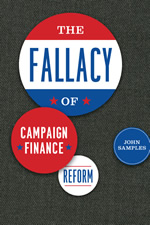Politics and money
 Drawing on the thesis of John Samples’ latest book, The Fallacy of Campaign Finance Reform, George F. Will’s recent op-ed in the Washington Post supports Sample’s contrarian view that campaign financing reform is a bad idea—especially for the liberal constituents who support it most. Will writes:
Drawing on the thesis of John Samples’ latest book, The Fallacy of Campaign Finance Reform, George F. Will’s recent op-ed in the Washington Post supports Sample’s contrarian view that campaign financing reform is a bad idea—especially for the liberal constituents who support it most. Will writes:
John Samples of the Cato Institute, in his new book, The Fallacy of Campaign Finance Reform, demolishes the argument that taxpayer funding has increased voters’ choices by increasing the number of presidential candidates. The seven elections before 1976 had an average of 10.7 candidates who received at least 1 percent of the votes in the two major parties’ primaries. Since taxpayer funding was enacted, the average has been 7.8 candidates. In the 15 elections since 1945, the two most successful independent candidates—George Wallace in 1968 and Ross Perot in 1992—did not use government funds. Taxpayer financing, which liberals love, did help Ralph Nader win 2.7 percent of the 2000 vote that cost the liberals’ candidate, Al Gore, the presidency.
Defying long-held assumptions and conventional political wisdom, The Fallacy of Campaign Finance Reform is a provocative work that will be essential for anyone concerned about the future of American government.
Read the introduction.